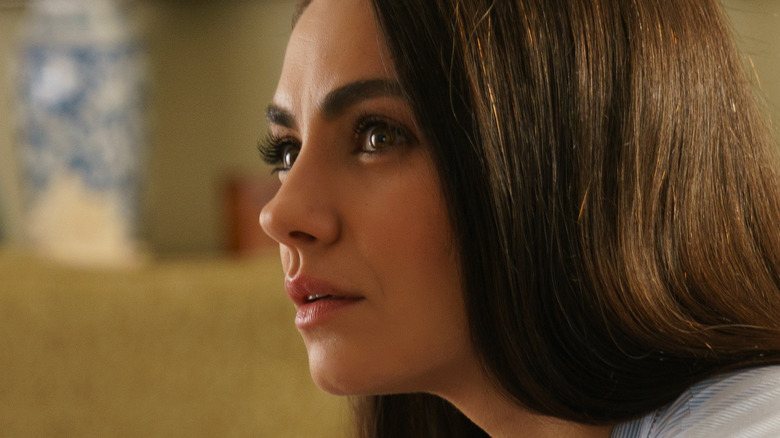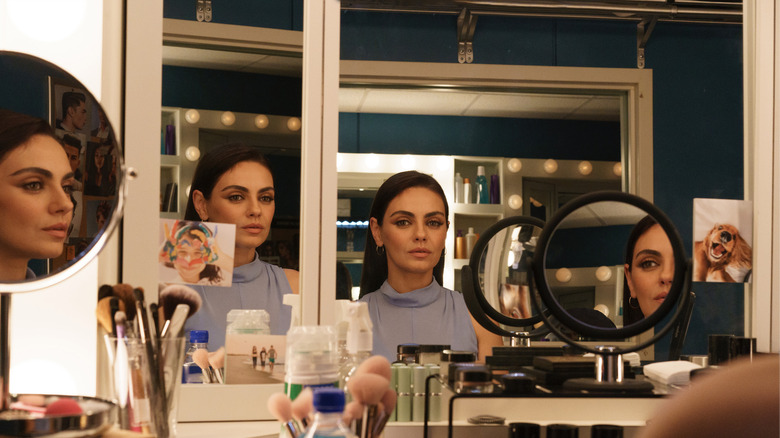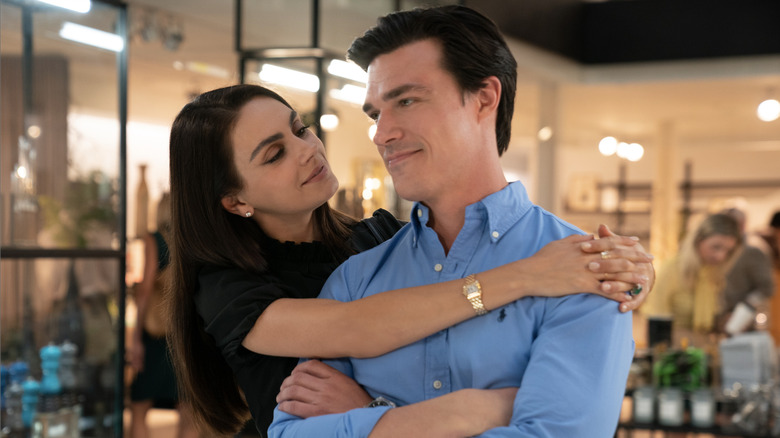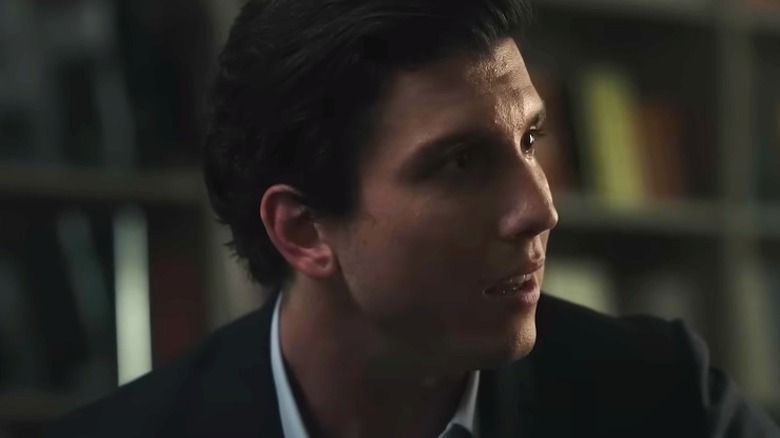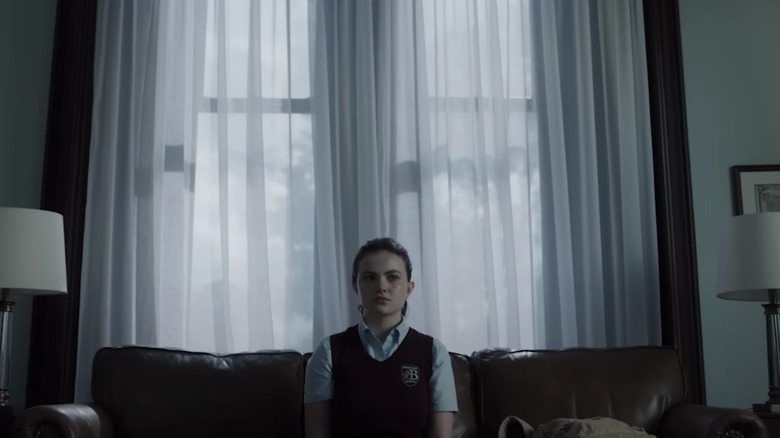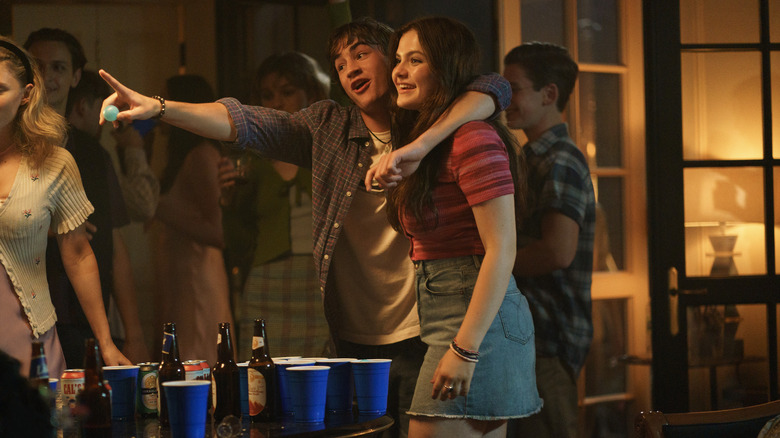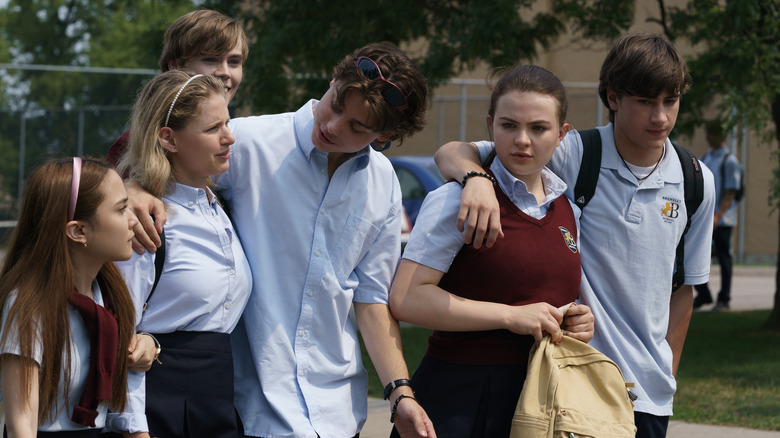The Ending Of Luckiest Girl Alive Explained
The following article includes discussions of gun violence and sexual assault.
Mila Kunis' new Netflix film, "Luckiest Girl Alive," is, at first glance, just one more thriller starring another unreliable female narrator, a genre trope that is by now so unsurprising Netflix parodied it for an entire series in "The Woman in the House Across the Street from the Girl in the Window." However (in a shocking twist), "Luckiest Girl Alive" isn't about an unreliable narrator who drinks too much wine, but it is instead an emotional (ultimately hopeful) narrative about sexual assault, childhood trauma, and gun violence. Initially, Ani constantly narrates her actions, contradicting what she says and the polite, professional smile pasted on her face. However, the audience realizes she's not unreliable; rather, she's full of self-loathing and anger, unable to forgive herself for the horrifying events of her teenage years.
The film is based on the New York Times bestselling debut novel of the same name, written by Jessica Knoll, who also penned the screenplay. Since the book's release, Knoll has opened up about her own history of sexual assault, revealing that the rape scenes in the book and subsequent film are based on her experiences during high school.
Reviews for the film have been mixed, and there's been some backlash about how some of the traumatic events in the movie are portrayed, which is fair considering the film's pacing is jarring and the tone is often at odds with its serious material. Yet, the ending of "Luckiest Girl Alive" offers a positive message of unity and the necessity of community support for survivors.
TifAni brings people together in the end
Adult TifAni, sometimes called Ani, is played by Mila Kunis, and young TifAni, sometimes called Tiffy (or Finney, to much ire), is played by Chiara Aurelia. As a middle-class girl thrown into the world of elite private schools, TifAni is constantly reminded of her differences. For most of "Luckiest Girl Alive," TifAni is obsessed with her reputation and how she appears to others. This insecurity follows her into adulthood as she equates confidence and inner peace with financial success.
When TifAni binge eats a pizza and lies about it to her fiancé (blaming it on the waitress, no less) or bashes up the backseat of a taxi with her high heels, it becomes clear that TifAni hasn't fully dealt with the traumatic events of her past. By the film's end, however, Ani realizes that she needs to share what happened to her — an action that her fiancé Luke doesn't fully understand or support, leading to their breakup.
Ani finally forgives herself, letting go of her self-loathing through her writing. The final scenes show multiple women contacting Ani and commenting about their sexual assault experiences, an echo of the #metoo movement, which was started in 2006 by Tarana Burke and went viral in 2017 with an expose in the New York Times.
If you or anyone you know has been a victim of sexual assault, help is available. Visit the Rape, Abuse & Incest National Network website or contact RAINN's National Helpline at 1-800-656-HOPE (4673).
Sometimes love isn't enough
It seems odd that Ani (Mila Kunis) has chosen to marry a man who (at least, on paper) resembles the privileged high school students who traumatized her so. Still, by the end of the film, that choice makes more sense: No one believed she was a victim, and having the upper class's wealth and status is what she believes will bring her credibility.
Luke (played by Finn Wittrock), the "Lacrosse captain of Nantucket," has the pedigree to restore Ani's reputation. Yet, throughout the film, the two drift further apart as Ani's past insinuates itself into her present. With a documentary revisiting the tragic school shooting, Ani must finally confront the truth of her trauma, including seeing the surviving rapist, who has become a public figure based on his survival story. With so much of her terrible past creeping back into her mind, Ani struggles to keep up appearances so she'll belong in Luke's perfect world.
Luke discovers that Ani has written about her sexual assault during their rehearsal dinner and exposed the perpetrator. Disappointed and uncomfortable, Luke chastises her, telling Ani she should have resolved the issue privately. In their final scene together, Ani reveals that she secretly resents his privilege and doesn't feel like they should be together though she loves him. "I've never felt like you resent me," he says, stung and confused by her admission. Ani repeats the line her narrative voice has been saying throughout the movie, "Because I'm like a wind-up doll. Turn my key, and I'll tell you exactly what you wanna hear."
If you or anyone you know has been a victim of sexual assault, help is available. Visit the Rape, Abuse & Incest National Network website or contact RAINN's National Helpline at 1-800-656-HOPE (4673).
If you have been impacted by incidents of mass violence, or are experiencing emotional distress related to incidents of mass violence, you can call or text the Disaster Distress Helpline at 1-800-985-5990 for support.
The villain gets his dues
Dean Barton (Alex Barone plays the adult version, and Carson MacCormac portrays young Dean) is the prominent villain of "Luckiest Girl Alive." His wealth and good looks protect him from the consequences of his bullying and predatory behavior. While the character of Dean feels a bit like the pinnacle of rich boy privilege at times, with some of his lines overly crafted to rationalize what he did to Ani, he does serve as a perfect example of many of the attitudes that survivors of sexual assault face.
Dean unconsciously mimics what the principal tells TifAni: "I was drunk. I didn't even understand that that is what I was doing." He seems to believe his alcohol use absolves him from responsibility, while Ani's alcohol use condemns her to bear all responsibility. "If you talk about that night, I'll deny it," he tells her, assuring her that more people believe him than her. Worse, he even insinuates that she was complicit in the gunmen's attack on him and other fellow students.
At a book reading, Ani finally confronts Dean, asking him, "Do you know how many times I've said the word 'rape' in my life? I wonder if you've ever used it, even once?" He responds that he hasn't, prompting Ani to give one of her best lines of the entire film, saying, "I'm gonna sit here and watch you squirm while you make it a part of your vocabulary." Dean finally admits what happened that night, looking around the room to see who's watching first. And that's when audiences get the big reveal; Ani reaches into her bag and pulls out her phone, rewinding the recording to ensure that his confession is nice and clear. Game over.
If you or anyone you know has been a victim of sexual assault, help is available. Visit the Rape, Abuse & Incest National Network website or contact RAINN's National Helpline at 1-800-656-HOPE (4673).
If you have been impacted by incidents of mass violence, or are experiencing emotional distress related to incidents of mass violence, you can call or text the Disaster Distress Helpline at 1-800-985-5990 for support.
No award for mother of the year
TifAni's mother in "Luckiest Girl Alive," Dina (played by Connie Briton), is a problematic character at best. At worst, she's a villain in her own right, as her obsession with status and wealth makes her judgmental and unsupportive toward her daughter. "What are people going to say?" she screams at TifAni in the car after discovering that TifAni had been intoxicated at the party, refusing to admit that what happened was assault.
This scene, which deftly flashes back to the car ride with her mother, and the interview with Aaron, the documentary filmmaker (Dalmar Abuzeid), is exceptionally well-done. Aaron questions why she never reported the rape during high school, and Ani demurs, saying diplomatically that "it didn't seem like was worth pursuing." Instantly, viewers are back in the car ride to hear the horrifying moment when Dina says, "You disgust me."
"I'm sorry," Ani says, pleading with her mother to forgive her. "You're not the daughter that I raised," she spits back, shaming Ani and condemning her to two more years at the same high school where she was bullied and abused. Thankfully, there will be some justice for Ani later on, when she goes on the "Today Show" to discuss her essay; from her kitchen at home, Dina watches Ani on television, struck by the knowledge of her complicity in silencing her daughter. Ani turns to the camera, seemingly to her mother, and says to the audience, "know that you have nothing to be ashamed of."
If you or anyone you know has been a victim of sexual assault, help is available. Visit the Rape, Abuse & Incest National Network website or contact RAINN's National Helpline at 1-800-656-HOPE (4673).
Mothers and daughters is never an easy relationship
"Luckiest Girl Alive" is not a subtle film, and while many mother-and-daughter relationships are filled with tension and disagreement, Dina and TifAni's relationship is particularly contentious. Ani's mother is portrayed as a social climber in the start, fixated on her daughter achieving success and marrying well, an attitude that audiences see later when Dina and the Harrisons (Ani's in-laws) spend an afternoon together. However, Dina can sense her daughter's disdain for her, and the two have a nasty argument filled with resentment and judgment.
During the argument, Dina repeats problematic (and frankly, common) beliefs about raising daughters, snapping at Ani that the Harrisons have no clue what it is like to have a girl. "They had boys. They didn't have a girl who developed early and was hell-bent on taking risks," she says, setting the scene to blame TifAni for the attack on her, before delivering the final, devasting line: "I did everything in my power to protect you...That's why I had all those rules in place that I did, but you didn't want to follow those. That was your choice."
Later, Aaron (the filmmaker) questions Ani about her mother's support, wondering if she wishes her mother had done more to her help, and her inner voice tells the audience that her own mother was disgusted by her, which exacerbated the trauma her daughter went through. There is no on-screen forgiveness or understanding between the two women. While Dina looks regretful while watching Ani on TV, audiences never see a reconciliation. But perhaps that's a good thing, as not all relationship schisms can or should be fixed.
The film doesn't shy away from complex issues
One of the main themes of "Luckiest Girl Alive" is the societal response to sexual assault and dealing with the trauma after a shocking event. Much of the film is centered on Ani as she processes the pain of what happened to her, with most characters around Ani being unsupportive of her and perfectly displaying how survivors are often treated in real life.
Arthur (Thomas Barbusca), Ani's fellow outcast at the Brentley School, sympathizes at first with Ani and is happy to come to her defense, becoming physically violent towards Luke. But then Arthur lectures TifAni, shaming her for failing to report the attack and even calling her "spaghetti spine" as his rampage reaches deadly levels. While on the surface, he claims to be protecting Ani, he is also acting on his own rage.
Only Mr. Larson (Scoot McNairy), Ani's English teacher, has any helpful sympathy toward her and encourages Ani to tell the principal what happened. Naturally, the principal does his best to dissuade her from reporting the situation to the police, implying that a police investigation could damage the boys' college applications — an echo of the "promising young man" refrain. He also refers to her alcohol use, saying, "If you decide to go that route, you need to be absolutely sure about what saying, and that can be difficult to determine with so much alcohol involved. The situation has been obfuscated." It's disturbing and unsettling to see the situation play out, mimicking as it does so many real-life court cases, but it's effective just the same.
Toxic masculinity makes an appearance
In "Luckiest Girl Alive," toxic masculinity is everywhere. TifAni deals with it in her fiancé as he lectures her about choosing to name her attacker and reveal what happened to her in a viral essay, and it's everywhere in her high school, from her boyfriend to her male friends.
This is most apparent after she tells her friends, Arthur and Ben, about what happened to her, when she's harangued and harassed for not acting the way they want, with Arthur telling her, "I want you to act like you have a smidge of dignity." TifAni then apologizes for making him mad, which he puts back on her, cutting Ani down with, "You should be mad at you. You had a chance to take him down, and you didn't."
Even Aaron, the filmmaker, has his moments, for all he tries to respond sensitively to her. When Ani storms out of the interview after being ambushed by Dean, Aaron races after her and says, "What about all the other women."
Mila, Chiara, and Jessica have lots of thoughts
Jessica Knoll, the original author of the novel, was also the writer of the screenplay for "Luckiest Girl Alive," enabling her to have a strong voice in the creative process for the film. Similarly, Mila Kunis (adult TifAni) and Chiara Aurelia (teenage TifAni) have also had a hand in their character's on-screen development.
Mila and Chiara had a video call before filming, trying to decide how they'd portray the character's "journey and backstory and mannerisms, and how she walked and talked and moved and breathed," she told ET Online. As Chiara told Teen Vogue, her part of the story was full of "shame and regret for something that completely isn't her fault... I hope people can see that there's a way out. Ani ends up finding her voice and becoming who she is."
As Mila Kunis told The Wrap, there are three versions of Ani: "I realized that everybody kept referencing the fact that there's a younger and an older version, and I was like, 'Oh, no, sorry. Let me then clarify. There's three.' There's the person that she puts forward as a persona as somebody that she hopes to be, that she hopes to be accepted that she hopes is the person that other people want her to be. And then there's a person inside that's that is trying to figure out who she is."
The backlash against the film is intense
"Luckiest Girl Alive" deals with controversial issues and disturbing themes with several unsettling and violent scenes. For many viewers, these scenes were triggering; some viewers took to Twitter to express their displeasure, saying that Netflix should have included more content warnings before the film. In response to the backlash, Jessica Knoll, the novel and film's writer, told Digital Spy, "We talked about it extensively. In the end, we gave it the strong rating that it has. It doesn't just say 'sexual violence,' it says 'rape,'" she explained. "We made the decision to include that word in it."
There's been a particularly strong backlash against the film for its graphic depictions of gun violence and sexual assault. However, Knoll feels differently, believing the movie has been singled out due to its criticism of violence against women, telling Variety, "We've done a lot to be sensitive about all of the very sensitive issues that are in the film. I am a little surprised by it, honestly, because there's so much violence against women in a lot of things out there right now. I just don't see people in an uproar about that."
Mila Kunis wanted a different ending
Jessica Knoll and her producers sent Mila Kunis an early screenplay of the film, and according to Knoll, Kunis was interested in the role, but only if the ending changed. Kunis was on the hunt for a dramatic role, one that dealt with tricky issues and could lead to "conversations" between audience members. Yet, Kunis had concerns that there was no arc for TifAni. In an essay for Vogue, Knoll explained, "That old ending, which already deviated from the ending of the book, which I had already written and rewritten dozens of times already, involved Ani getting a big fat book deal for coming forward with her story." For Kunis, this had to change, telling Knoll, "It's all about using money and status as a crutch to feel superior to others, which is exactly who she is when we meet her at the start. Either let's hang a lantern on that, or let's show at least an inkling of change."
Knoll was devastated and spent hours trying to rethink the ending. How could TifAni change by the end of the book? The answer was simple: Ani's thinking needed to encompass others, to bring more women into her experience, and to change her proverbial storytelling tense from "I" to "We." Ani also needed to learn how to stand up for herself, rather than hiding behind a smile and thinking about how she'd like to respond in those intense inner monologues.
The words that finally became the ending? "When I sat down to write this essay, my goal was to avenge my reputation, maybe stick it to the people who had hurt me. But it's become so much more than that. So much more than me. It's about the importance of all of us speaking up, even when people want to silence us so that we can become the type of women our younger selves would be proud of." And thus, Ani has successfully managed her demons, brought her own true face to the fore, and found success in helping others who've experienced similar violence and injustice.
